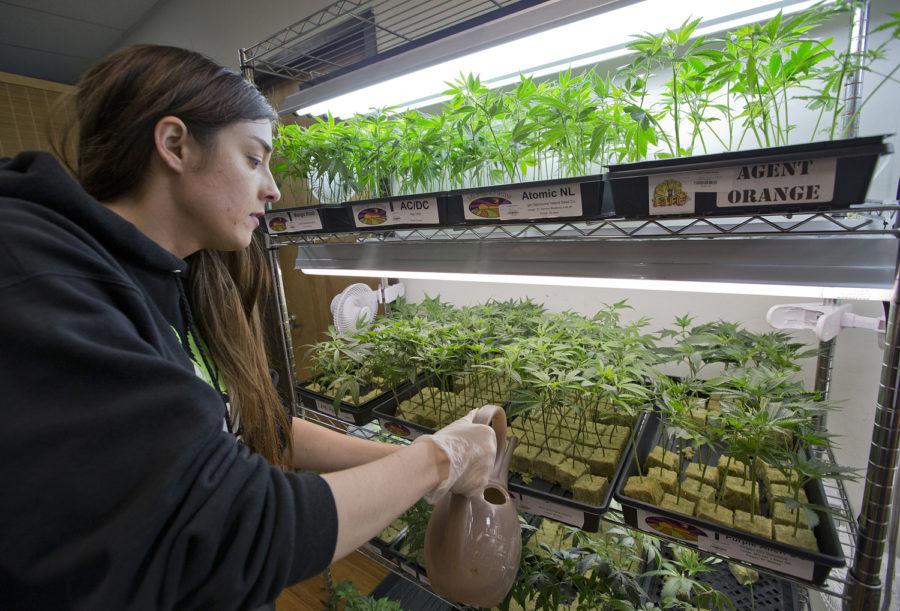Opinion | Thank the people, not the politicians
Elyse Jones waters marijuana clones at the Harborside Health Center medical marijuana dispensary on May 14, 2015, in San Jose, California. Medical marijuana has been legalized in 32 states thanks to pressures from criminal justice reform proponents, civil rights groups and drug policy reform advocates.
February 13, 2019
Congratulating politicians for doing the right thing feels natural when the world is burning. But we should thank the everyday people who fight to make a difference first.
Although the political climate in America seems to have grown worse over the past few years, we have seen some remarkable improvements. Voters chose in November to legalize marijuana, either recreationally or medically, in four states. President Donald Trump signed the 2018 Farm Bill to legalize hemp and provide aid to local farmers. The Senate passed a bipartisan bill to end the brutal war in Yemen.
More recently, four presidential contenders for 2020 have endorsed the idea of a Green New Deal for radical action against climate change. Tennessee Gov. Bill Haslam granted clemency to Cyntoia Brown after she spent 15 years of her life to prison for self-defense.
Politicians may try to take credit for doing these things to keep their seats safe, but they did not spark the movements behind these changes: the people did.
The push to legalize marijuana shows the power of people rising up against injustice and shifting the political climate. At the start of the decade, no states had made the drug legal. Now, thanks to massive organizing efforts by criminal justice reform proponents, civil rights groups and drug policy reform advocates, it has been recreationally legalized in 10 states and the District of Columbia, and legalized for medicinal use in 33 states.
Politicians did not win these battles. Nine out of 10 states that legalized recreational marijuana did so through the democratic process of ballot initiatives. Organizations like the American Civil Liberties Union, Americans for Safe Access and Students for Sensible Drug Policy represent just some of the many people who fought and continue to fight for safe access to the non-addictive drug.
As much as some political leaders would love to claim responsibility for their progressive positions on marijuana legalization, a surprising amount of them have only held these beliefs very recently.
Sen. Dianne Feinstein, D-Calif., directly opposed the 2016 marijuana legalization ballot initiative in her home state of California, but she changed her mind two years later. Senate Minority Leader Chuck Schumer, D-N.Y., himself stated that he started to support federal decriminalization in 2018 after polls showed that two-thirds of the electorate wanted full legalization.
Rep. Joe Kennedy III, D-Mass., expressed disapproval of marijuana legalization early last year and reversed his position only six months later. We should acknowledge the many people who normalized decriminalization and legalization discourse before congratulating politicians who adjusted their positions under pressure.
The political expediency surrounding Cyntoia Brown’s clemency highlights the importance of thanking the right people.
Despite placing multiple conditions on her release and withholding her freedom for six more months, Haslam announced in January he decided to end Brown’s decade-and-a-half long nightmare. Public figures like Kim Kardashian West were quick to thank him for his recent decision.
It’s worth noting that he most likely would have never granted her clemency if the #MeToo and #BlackLivesMatter movements did not tirelessly strive for her liberty. Not only did they revive the push to free Brown, but they pressured a Republican governor enough to succeed.
While Gov. Haslam made the right decision, we shouldn’t ignore the clear motivation to preserve a positive legacy. He deserves little to no kudos for an action long past due. Instead, we should thank the men and women who fought to make this happen.
Even rising firebrand Rep. Alexandria Ocasio-Cortez should not personally receive credit for her involvement in bolstering the idea of a Green New Deal among fellow politicians.
The Sunrise Movement, a grassroots organization founded in 2017 to combat climate change for the welfare of future generations, spearheaded the Green New Deal. They popularized the concept with November protests in Washington, D.C. Young people sat in Nancy Pelosi’s office and faced arrest to pressure Democrats to treat the grave issue of climate change more seriously. Evidently, it worked.
While Ocasio-Cortez’s genuine politics can be refreshing, she did not mastermind her proposed improvements. Idolizing individual political leaders rather than focusing on policy leads to disaster, disappointment and — most dangerously — blind loyalty.
Ralph Northam, D-Va., won the governorship by nine points in 2017 because of the raucous enthusiasm surrounding his candidacy. Shortly after his election, he vetoed legislation progressives labeled racist that heightened his ardent support. Even after he admitted to his involvement in a blackface scandal, voters are split on whether he should continue to govern. Northam has apparently obtained enough blind loyalty to free himself of any major consequences.
Politicians do not deserve personal devotion or praise for the work that they do. Instead, they deserve to be scrutinized and pressured by their constituents. We should expect our representatives to do their job right. The fact that we salute them for doing so indicates that we have a lot of work left to do.
Until the world stops burning, we will keep holding their feet to the fire.








